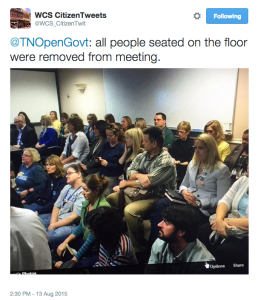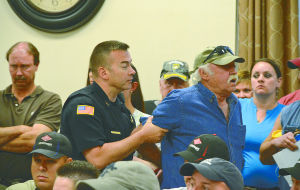Tennessee Coalition for Open Government receives several calls each year to our Help Line from citizens (and sometimes government officials) who describe situations in which they believe that the Open Meetings Act has been violated. The complaints range from watching county commissioners recess a meeting and gather in a hallway to discuss something privately, then coming back for a vote, to private discussions between members and surprise votes with no public discussion.
Sometimes citizens feel like they have been intentionally shut out of a public meeting through lack of seating or space, conditions where they can’t hear, or even locked doors.

Citizens have complained the Williamson County School Board holds work sessions in a room too small for all the citizens who want to attend. The chairman has refused to move the meetings, saying they are for the board to work, not for the public, and the cozier setting is more appropriate.
These conditions and this type of behavior — to discuss privately what should be discussed in public — robs a community of fully understanding why their representatives have made the decisions they have and keeps them in the dark in such a way that they can’t fully participate in the democratic process. It reduces accountability.
The state of Tennessee set up the Office of Open Records Counsel in 2008. Among its duties is collecting information about open meetings violations:
Tennessee Code Annotated 8-4-601 (a) “…The role of the office shall also include collecting data on open meetings law inquiries and problems and providing educational outreach on the open records laws compiled in title 10, chapter 7, and the open meetings laws compiled in chapter 44 of this title.”
It no longer has an open meetings complaint form, but you can still let the office know of your problem by filling out an inquiry form.
There is no requirement that the state investigate the complaint. However, in the past, the Open Records Counsel routinely would follow up on complaints by letting the governmental entity involved know that a complaint had been filed, the nature of it, and explain the law. Sometimes, this is enough to prompt the governing body to change its behavior.
Another public benefit of filing a complaint or inquiry is that the Open Records Counsel will be able to track the number of received complaints as part of an annual report required to be filed to the General Assembly and Governor. This process is one way to keep the legislature and the governor appraised of potential problems.
I encourage you to file a complaint if you believe a violation has occurred. Be as specific as possible. I also encourage you to contact the Open Records Counsel and/or contact the Tennessee Coalition for Open Government (TCOG) to find out about the law and its requirements. TCOG is an independent nonprofit organization not associated with state government and has a long and respected history of providing help to citizens, journalists and government officials to promote transparency in government since its formation in 2003.

Citizen Eddie Overholt was cuffed, arrested and ejected from a Greeneville Industrial Development Board meeting after he asked the governing body to speak up so people could hear. Board members were not using the microphones and at times talked with each other in hushed tones. The charges against Overholt of disrupting a public meeting were later dropped. And a judge, after a lawsuit was filed, said that, contrary to the board’s argument, the Open Meetings Act does require that meetings be audible and that people be allowed to participate.
There are other options also:
- Contact the person who represents you on the governing body (your county commissioner, or school board member, for example), or someone else on the governing body and explain your concern. There often is someone on a governing body who wants to make sure they do things right.
- Contact a local media organization and tell them about it. While they can’t cover every story, they are usually very interested in potential Open Meetings violations. Remember, they are often at the meetings, too.
- Ask to speak to the governing body to share your concerns, such as during public comments at one of its public meetings, and explain why it is important to you and citizens for all government business to be done in the “sunshine.”
- The law allows you to file a lawsuit, and then a judge would decide if an open meetings violation occurred. This tends to be a costly and sometimes time-consuming long process, but it is an option — particularly if the governing body persists in secretive behavior and does not respond to other encouragement or outreach.
One important thing to realize about our law is that there really is no penalty for violating it. A judge might rule that the action taken in violation of the Open Meetings Act be null and void, but often a governing body can “cure” the violation through a “redo” in which they engage in substantial reconsideration and deliberation on the topic and do things right.
That’s why I believe that one of the best ways to bring about change is to shine a spotlight on what is happening.
